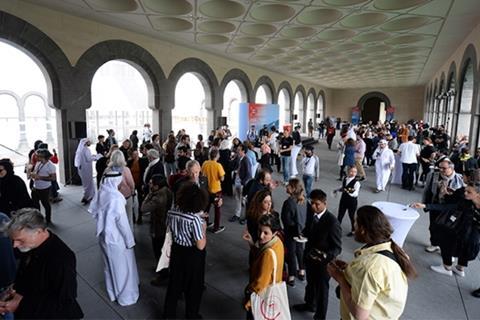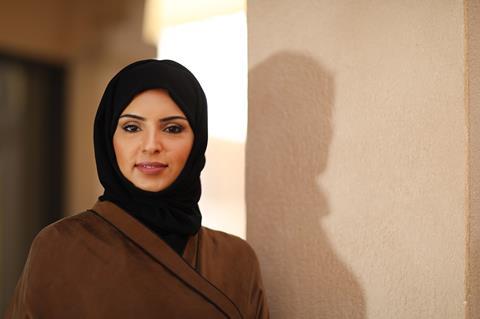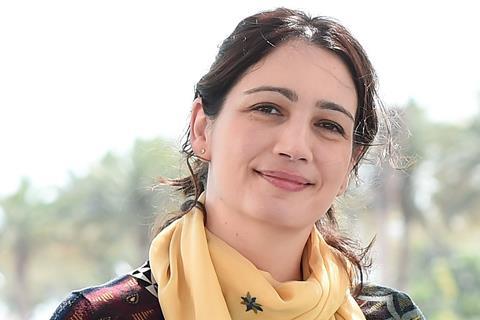
As 200 industry guests from 41 countries arrive in Doha for this week’s Qumra talent incubator, they will find an event refreshed from a four-year break since its last in-person edition.
For the first time, the event is taking place in the Msheireb district – newly-built to accommodate the increase in visitors for last year’s football World Cup, and adjacent to the previous Souq Waqif base. “Part of the experience for Qumra is the hospitality aspect – the atmosphere and discovering the local culture,” says Hanaa Issa, Qumra deputy director and director of strategy and development at the Doha Film Institute (DFI), which runs the incubator.
All the venues for meetings, masterclasses and screenings are in walking distance – a big step in a region that has often been reliant on vehicular transport. “We wanted to create this pedestrian experience as much as possible for the guests,” says Issa. “It has state-of-the-art facilities and hotels, and people can walk as much as possible. It’s convenient and modern, but still very close to the traditional and charming aspects of the Souq.”
Anticipation is high for Qumra’s return: the 500 QAR (£115/$137) Qumra Pass, which provides public access to all masterclasses and screenings, has sold out, while the individual screenings are approaching the same. After three online-only editions from 2020-2022, this year will pioneer a separated hybrid format, with the in-person event from March 10-15, followed by online meetings and screenings from March 19-21.
Representatives from across the industry will participate in the event, from sales companies – including The Match Factory, Heretic, Memento – to festivals – Cannes, Venice, Berlin and Sundance – and streamer and broadcast executives from HBO Max, Paramount International and Mubi.
The mission remains the same – “making the script-to-screen journey for exceptional talent from around the world as seamless as possible,” according to DFI chief executive Fatma Hassan Alremaihi. A smooth path from the Institute to Qumra helps in this regard: of the 44 projects selected this year across the development, production, post-production and series strands, 24 have previously been backed by the DFI and/or selected for one of its programmes.
Consultants on this year’s projects include Venice programmer Paolo Bertolin, festival consultant Violeta Bava, and sales and acquisitions experts such as Marc Lorber and Films Boutique’s Gabor Greiner.
Qatar’s big year

Bringing over three million visitors to Qatar for the football tournament has put a brighter spotlight on the country – and the film industry is looking to make the most its moment. “Qatar has demonstrated itself as a progressive nation receptive to new ideas with a thirst for exploring the medium of film to tell our stories,” says Alremaihi, although she cautions that it won’t be instantaneous. “The evolution of the film industry is an organic process and can’t be forced. Our various initiatives form a solid foundation for a film industry that is focused on the long term. Production infrastructure is still developing, and it is exciting to see it rapidly unfold as we continue to see capacity and capability grow in all production phases.”
Thirteen of the 44 projects at this year’s event are from Qatari or Qatari-based filmmakers, including Motherhood, a Tunisia-France-Canada-Qatar co-production from Meryam Joobeur. The Tunisian-Canadian filmmaker’s Brotherhood was nominated for best live action short at the 2020 Oscars; Motherhood, her feature debut which is currently in post-production, centres on a mother who blinds herself to the darkness in her son’s soul.
Also in the Qumra post-production strand is Kamal Lazraq’s Hounds, following a father and son struggling to survive in the working-class suburbs of Casablanca. Moroccan director Lazraq’s debut feature has been highly anticipated by the MENA industry, ever since he won second prize at the 2011 Cannes Cinefondation for his short Drari.
There will be international interest in Lina Soualem’s Bye Bye Tiberias, a documentary about the journey of her mother, actress Hiam Abbass, from her native village in Palestine to being a star through titles such as HBO’s Succession.
This year will be a first in-person Qumra for the series strand, which launched in 2020. The seven projects include France-Qatar co-production Let The Earth Burn from French director Sofia Alaoui, who won a special jury award at Sundance in January for debut feature Animalia – itself a DFI grantee.
Challenge
Qumra’s in-person hiatus has seen the birth of another MENA event, Saudi Arabia’s Red Sea Film Festival, which held its second edition in December last year. A rising tide lifts all boats, according to Alremaihi.
“We have always believed in the great potential for creating outstanding cinema in the region, and more film events means increased opportunities for people in the cinema ecosystem,” says the CEO, adding that “more film activities in the region makes for a more robust and representative industry, and that is beneficial to not only the Arab film community, but all of cinema.”
First run in 2015 and now in its ninth edition, Qumra is beginning to reap the benefits of past editions – including the willingness of top film talent to attend as masters. Each speaker gives a two-hour masterclass, with directors Lynne Ramsay and Michael Winterbottom, producer David Parfitt, writer Christopher Hampton, and costume designer Jacqueline West as this year’s masters.

When it comes to securing such names, “we never cold call anyone,” says Issa. “A lot of it has become word-of-mouth, and previous editions that have introduced us to other people. This is something that our artistic advisor [Palestinian director] Elia Suleiman is intimately involved with.”
The Qumra team are keen to build lasting relationships; Parfitt has previously attended the event to view projects, while previous master Rithy Panh has also mentored projects for the event, with a focus on the documentary titles this year.
It is a complete coincidence that four of the five masters this year are from the UK, says Issa; but also indicative of “a very successful and prominent film industry” in the UK. Having supported Qumra throughout its existence, British Council has come onboard as an official partner this year, providing connections and introductions to international industry – “acting as a bridge between the DFI’s work and cultural work in Qatar”, as Issa puts it.
The eight completed films screening during the event were all backed by the DFI with several Qumra alumni, and are a precursor of possibility for the projects currently in development. Titles include Erige Sehiri’s Under The Fig Trees, which debuted in Directors’ Fortnight at Cannes last year and became Tunisia’s Oscar entry; and Apichatpong Weerasethakul’s Cannes 2021 Competition entry Memoria.
The hiatus has made the Qumra team “super hyper” to get back to business with “a good case of the jitters
”It’s the same size [as before the pandemic],” says Issa. ”We wanted to keep that intimate feel – maintaining that type of interaction between the projects and professional guests. It’s a gathering of passionate people.”

























No comments yet